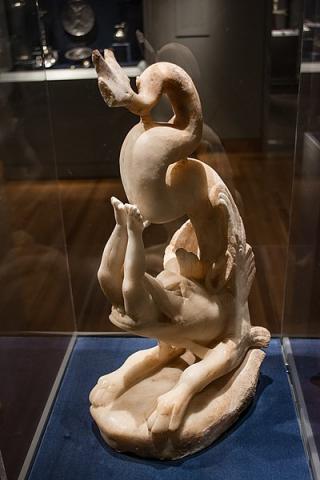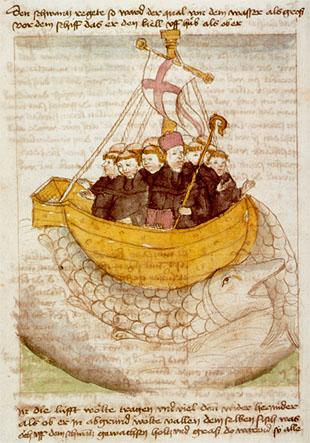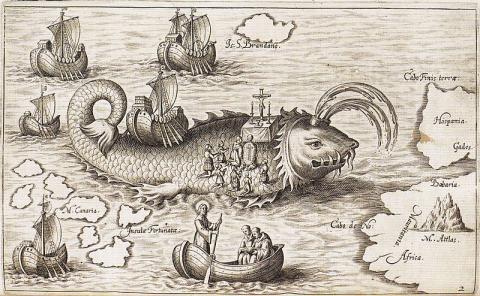[1] Cum autem vēnissent ad aliam īnsulam, coepit illa nāvis stāre, antequam portum illīus potuissent tenēre. [2] Sānctus Brendānus praecēpit frātribus exīre dē nāvī, in mare, et ita fēcērunt; tenēbantque nāvim ex utrāque parte cum fūnibus, usque dum ad portum vēnit. [3] Erat autem illa īnsula petrōsa sine ūllā herbā. Silva rāra erat ibi, et in lītore illīus nihil dē arēnā fuit. [4] Porrō pernoctantibus in ōrātiōnibus et in vigiliīs frātribus forīs nāvim, vir Deī sedēbat intus: sciēbat enim quālis erat illa īnsula; tamen nōluit indicāre, nē fuissent perterritī.
[5] Manē autem factō, praecepit sacerdōtibus ut singulī missās cantāssent, et ita fēcērunt. [6] Cum sānctus Brendānus et ipse cantāsset in nāvī, coepērunt frātrēs carnēs crūdās portāre forās dē nāvī, ut condīssent sale illās, et etiam piscēs quōs sēcum tulērunt dē aliā īnsulā. [7] Cum haec fēcissent, posuērunt cācabum super ignem. Cum autem ministrābant lignīs ignem et fervēre coepisset cācabus, coepit illa īnsula sē movēre sīcut unda.
notes
Iasconius. They arrive at the next island, but find it hard to land; the island is also quite bare. All the monks except Brendan disembark and spend the night in worship, but Brendan stays in the boat, because he understands their situation. The next morning, after Mass, the monks start to preserve their meat and to cook it. But the "island" starts to move, like a wave.
The island is in fact a whale. There are a number of similar stories in ancient literature, perhaps based on an awareness of floating icebergs. The most famous big sea creature in the Bible is one that swallowed Jonah (Jonah 2.1), taken by Christians as prefiguring the death and resurrection of Jesus (Matthew 12.38-40). The “island” is thus an appropriate place to celebrate Easter Eve and Easter morning.
[1] coepit illa nāvis stāre: i.e., the boat went aground; much of the “island” lay just below the surface.
portum tenēre: “arrive in port.”
[2] usque dum ad portum vēnit: sc. nāvis.
[3] Silva rāra erat ibi: the scattered “trees” turn out to be bristles.
nihil dē arēnā: CL would be nihil arēnae.
[4] forīs nāvim: forīs, normally an adverb, is here a preposition with the accusative (ML).
[5] sacerdōtibus: most monks were not priests. Either the author is using the word loosely, or some of Brendan’s monks were also priests, like Brendan himself, as suggested by 15.21.
ut singulī missās cantāssent: “that each one of them should sing.”
cantāssent: CL would be cantārent.
[6] coepērunt frātrēs carnēs crūdās portāre, etc.: the focus on food preparation has symbolic overtones: the monks will celebrate Easter with a real (physical) meal, and a spiritual one (Holy Communion).
condīssent: CL would be conderent.
piscēs quōs sēcum tulērunt dē aliā īnsulā: The streams on the Island of Sheep were full of fish (9.3) and we now learn that they had brought some with them.
[7] Cum autem ministrābant lignīs ignem: They were feeding the fire with logs. The fire has additional symbolic overtones; in Ireland the lighting of a Paschal fire was part of Easter celebrations.
vocabulary
| stō stāre stetī statum | to stand; to stand firm [OLD 3a] 1 |
| portus portūs m. | harbor |
| teneō tenēre tenuī tentus | to hold, keep; to reach in journeying, make [OLD 5a] |
| faciō facere fēcī factus | to do, make; to act, conduct oneself [OLD 28] 2 |
| teneō tenēre tenuī tentus | to hold, keep; to reach in journeying, make [OLD 5a] |
| fūnis fūnis m. | rope, line |
| ūsque | until (often with ad or dum) |
| portus portūs m. | harbor |
| petrōsus –a –um | rocky 3 |
| herba herbae f. | grass; herb, edible plant |
| arēna (harēna) –ae f. | sand |
| porrō | next 4 |
| pernoctō pernoctāre pernoctāvī pernoctātum | to spend the night |
| vigilia vigiliae f. | a keeping of the watch; religious vigil [OLD 4] |
| forīs | out of doors, outside, abroad |
| intus | within, inside |
| perterreō perterrēre perterruī perterritus | to terrify |
| māne (indecl.) | the morning; in the morning; early next day 5 |
| faciō facere fēcī factus | to do, make; to act, conduct oneself [OLD 28] |
| missa –ae f. | the Mass (religious service) (LL) |
| cantō cantāre cantāvī cantātus | to sing |
| faciō facere fēcī factus | to do, make; to act, conduct oneself [OLD 28] |
| cantō cantāre cantāvī cantātus | to sing 6 |
| carō carnis f. | meat, flesh |
| crūdus –a –um | raw |
| forās | outside, on the outside |
| condō condere condidī conditus | to inter, bury [OLD 4]; to preserve (of foods etc.) [OLD 2b] |
| sāl salis m. | salt, wit |
| piscis piscis m. | fish |
| faciō facere fēcī factus | to do, make; to act, conduct oneself [OLD 28] 7 |
| cācabus –ī m. | cooking pot |
| ministrō ministrāre ministrāvī ministrātus | to tend, attend, serve |
| līgnum lignī n. | wood (usually plural) |
| ferveō fervēre ferbuī or fervō fervere fervī |
to boil |



